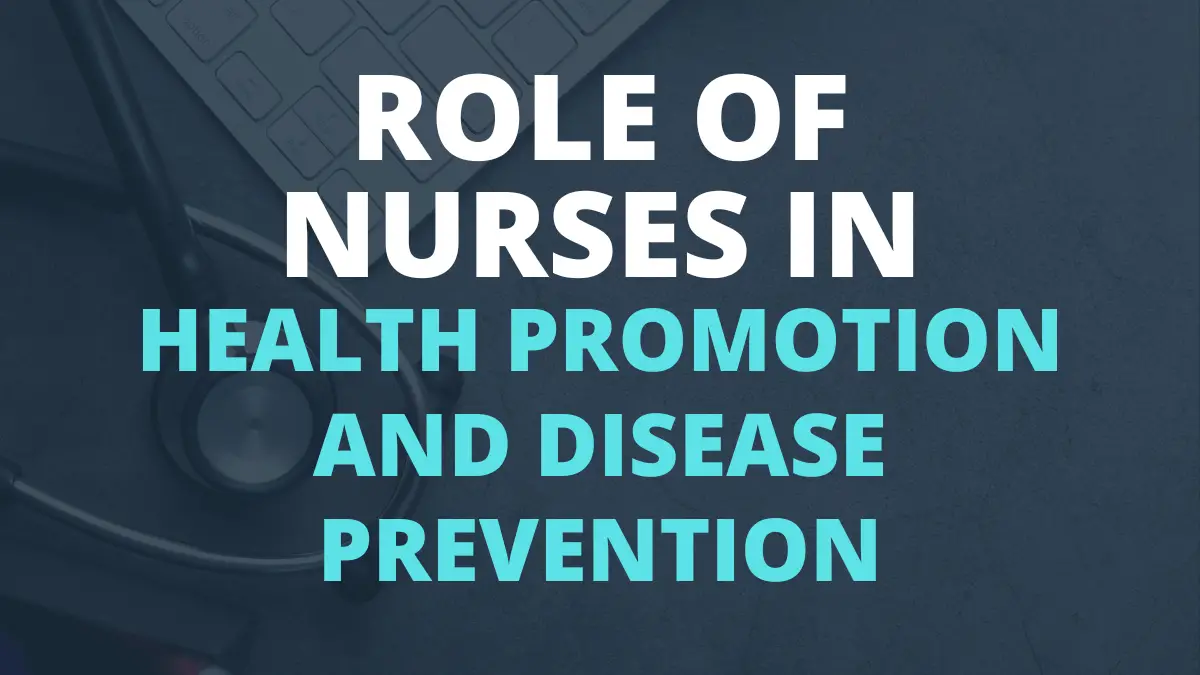Nurses play a pivotal role in promoting health and preventing diseases within communities. Beyond their traditional responsibilities of patient care, nurses are increasingly recognized as frontline advocates for public health initiatives. This article explores the multifaceted role of nurses in health promotion and disease prevention, highlighting their impact on individual well-being and broader societal health outcomes.
Understanding Health Promotion and Disease Prevention
Defining Health Promotion
Health promotion encompasses efforts to enhance health and well-being by addressing determinants of health such as lifestyle, environmental factors, and access to healthcare services. It involves empowering individuals and communities to adopt healthy behaviors and lifestyles through education, awareness campaigns, and preventive interventions.
Concept of Disease Prevention
Disease prevention focuses on reducing the incidence and burden of illnesses through proactive measures. It involves primary prevention to prevent diseases before they occur, secondary prevention to detect and treat diseases in their early stages, and tertiary prevention to mitigate complications and disabilities associated with existing conditions.
Table: Impact of Nurses on Disease Prevention
| Role of Nurses | Contribution to Disease Prevention |
|---|---|
| Immunization Campaigns | Administer vaccinations, educate individuals about vaccine benefits |
| Screening and Early Detection | Conduct screenings for various health conditions, facilitate early intervention |
| Chronic Disease Management | Provide ongoing monitoring, medication management, and lifestyle counseling |
| Epidemiological Surveillance | Report notifiable diseases, monitor disease trends, investigate outbreaks |
| Health Policy Advocacy | Advocate for evidence-based policies, improve access to healthcare services |
The Role of Nurses in Health Promotion
Nursing Assessment and Education
One of the fundamental roles of nurses in health promotion is conducting comprehensive assessments of patients’ health status, risk factors, and health literacy levels. Nurses utilize their clinical expertise to educate individuals and families about preventive measures, disease management strategies, and healthy lifestyle choices tailored to their specific needs.
Promoting Healthy Behaviors
Nurses serve as role models and advocates for healthy behaviors in clinical settings, workplaces, schools, and communities. They promote smoking cessation, encourage regular physical activity, advocate for nutritious diets, and provide guidance on stress management techniques. By fostering a culture of wellness, nurses empower individuals to take ownership of their health and well-being.
Community Outreach and Engagement
Nurses actively engage with diverse community stakeholders to identify health needs, develop targeted interventions, and facilitate access to healthcare services. They collaborate with local organizations, schools, faith-based groups, and public health agencies to address social determinants of health, promote health equity, and eliminate barriers to care. Through outreach programs, health fairs, and mobile clinics, nurses bring essential health services directly to underserved populations.
The Role of Nurses in Disease Prevention
Immunization and Infectious Disease Control
Nurses play a critical role in immunization campaigns aimed at preventing vaccine-preventable diseases such as influenza, measles, and COVID-19. They assess vaccine eligibility, administer vaccinations safely, monitor adverse reactions, and educate individuals about the importance of immunization in protecting themselves and their communities. Additionally, nurses contribute to infection control efforts in healthcare settings by implementing standard precautions, promoting hand hygiene, and managing outbreaks of infectious diseases.
Screening and Early Detection
Nurses conduct screenings for various health conditions, including hypertension, diabetes, cancer, and sexually transmitted infections, to facilitate early detection and intervention. They perform clinical assessments, administer diagnostic tests, and interpret results to identify individuals at risk or in need of further evaluation. Through regular screenings and health assessments, nurses empower individuals to proactively manage their health and seek timely medical care when necessary.
Chronic Disease Management
In collaboration with interdisciplinary healthcare teams, nurses play a key role in managing chronic conditions such as diabetes, hypertension, asthma, and cardiovascular diseases. They provide ongoing monitoring, medication management, lifestyle counseling, and support services to help individuals optimize their health outcomes and prevent disease complications. By promoting self-management skills and adherence to treatment plans, nurses empower patients to actively participate in their care and improve their quality of life.
The Impact of Nurses on Public Health
Epidemiological Surveillance
Nurses contribute valuable data to epidemiological surveillance systems by reporting notifiable diseases, monitoring disease trends, and investigating outbreaks. Through their frontline observations and interactions with patients, nurses play a vital role in early detection and containment of infectious diseases, thereby preventing further transmission and protecting public health.
Health Policy Advocacy
Nurses advocate for evidence-based policies and legislation that promote health equity, advance public health goals, and improve access to healthcare services. They participate in policy development, research initiatives, and professional organizations to influence decision-making processes at local, national, and global levels. By amplifying the voices of patients and communities, nurses drive positive changes in healthcare systems and public health practices.
Conclusion
Nurses are indispensable champions of health promotion and disease prevention, bridging the gap between clinical care and public health. Their holistic approach to patient-centered care, community engagement, and advocacy drives positive health outcomes and fosters resilient, thriving communities. As we navigate complex health challenges and strive for a healthier future, the role of nurses remains central to achieving our collective vision of wellness and well-being for all.

